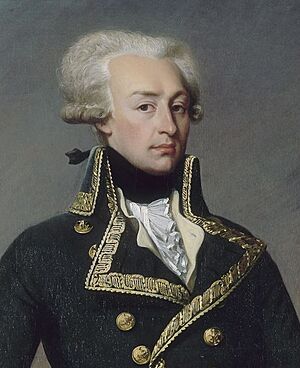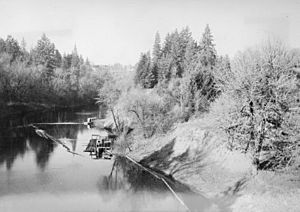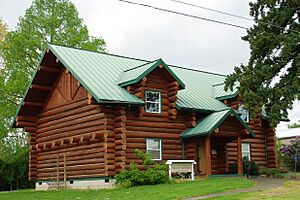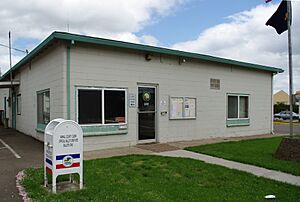Lafayette, Oregon facts for kids
Quick facts for kids
Lafayette, Oregon
|
|
|---|---|
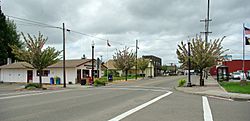
99W and 3rd Street in downtown
|
|

Location in Oregon
|
|
| Country | United States |
| State | Oregon |
| County | Yamhill |
| Founded | 1846 |
| Incorporated | 1878 |
| Government | |
| • Type | Council-Manager |
| Area | |
| • Total | 0.93 sq mi (2.40 km2) |
| • Land | 0.93 sq mi (2.40 km2) |
| • Water | 0.00 sq mi (0.00 km2) |
| Elevation | 223 ft (68 m) |
| Population
(2020)
|
|
| • Total | 4,423 |
| • Density | 4,776.46/sq mi (1,844.66/km2) |
| Time zone | UTC-8 (Pacific) |
| • Summer (DST) | UTC-7 (Pacific) |
| ZIP code |
97127
|
| Area code(s) | 503 |
| FIPS code | 41-40300 |
| GNIS feature ID | 2411593 |
| Website | www.ci.lafayette.or.us |
|
|
Lafayette is a small city located in Yamhill County, Oregon. It sits right by the Yamhill River and Oregon Route 99W. This city was first started in 1846 and officially became a city in 1878. In 2020, about 4,423 people called Lafayette home.
Contents
History of Lafayette
Lafayette was founded in 1846 by a man named Joel Perkins. He was an American pioneer and a business owner. Mr. Perkins had lived in Lafayette, Indiana before. He decided to name this new settlement in Oregon after Marquis de Lafayette. Marquis de Lafayette was a famous general who helped America during the American Revolutionary War.
The city got its own post office in 1851. It officially became an incorporated city on October 17, 1878. This was decided by the Oregon Legislative Assembly.
Lafayette was once the main town, or county seat, for Yamhill County. It held this important role from when it was founded until 1889. That year, people in the county voted to move the county seat to McMinnville.
Geography of Lafayette
Lafayette covers an area of about 0.90 square miles (2.40 square kilometers). All of this area is land. The city is located on State Highway 99W. It is found between the cities of McMinnville and Dundee.
Important Places in Lafayette
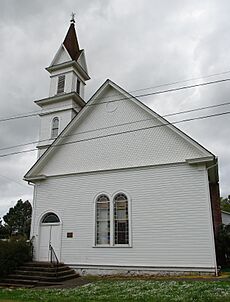
In 1900, a special lock and dam system was finished on the Yamhill River. This was about 1.5 miles downriver from Lafayette. The lock helped boats travel along the river. It was stopped from being used in 1954. The dam was later taken down on purpose in 1963. This was done to help salmon swim more easily up and down the river. Today, where the lock and dam used to be is now a county park.
Parks to Explore
Lafayette has several parks where you can play and relax:
- Abigail Scott Duniway Park
- Commons Park
- Community Pride Park
- Joel Perkins Park
- Plantation Park
- Terry Park
- Veteran's Park
Other Interesting Spots
Some other notable places in Lafayette include:
- Alfred P. Fletcher Farmhouse
- Evangelical Church of Lafayette - This church is listed on the National Register of Historic Places.
- James M. and Paul R. Kelty House
- Joseph Mattey House
- Wascher Elementary School
- Yamhill County Museum
Lafayette's Population Over Time
| Historical population | |||
|---|---|---|---|
| Census | Pop. | %± | |
| 1880 | 396 | — | |
| 1890 | 365 | −7.8% | |
| 1900 | 359 | −1.6% | |
| 1910 | 412 | 14.8% | |
| 1920 | 410 | −0.5% | |
| 1940 | 409 | — | |
| 1950 | 662 | 61.9% | |
| 1960 | 553 | −16.5% | |
| 1970 | 786 | 42.1% | |
| 1980 | 1,215 | 54.6% | |
| 1990 | 1,292 | 6.3% | |
| 2000 | 2,586 | 100.2% | |
| 2010 | 3,742 | 44.7% | |
| 2020 | 4,423 | 18.2% | |
| U.S. Decennial Census | |||
What the 2010 Census Showed
The census in 2010 counted 3,742 people living in Lafayette. There were 1,209 households, and 938 of these were families. The city had about 4,158 people per square mile. There were 1,315 homes in total.
Most of the people (84.6%) were White. A smaller number were African American (0.3%), Native American (0.9%), or Asian (0.7%). About 9.8% were from other races, and 3.6% were from two or more races. People who identified as Hispanic or Latino made up 22.0% of the population.
In 47.5% of the households, there were children under 18 years old. Most households (60.2%) were married couples living together. About 15.6% of all households had just one person living there. The average household had 3.10 people.
The average age of people in the city was 33.2 years old. About 32.1% of residents were under 18. About 8% were 65 years old or older. The city had slightly more males (51.3%) than females (48.7%).
Famous People from Lafayette
Some notable people who have connections to Lafayette include:
- Pauline Alderman, a music expert and composer.
- Stan Bunn, a politician.
- Bert E. Haney, a judge who worked for the U.S. Court of Appeals.
- Anson G. Henry, a doctor and friend of Abraham Lincoln. He also worked as a surveyor.
- George W. McBride, a politician who served in the Oregon Legislative Assembly and as a U.S. Senator.
- Matthew Deady
- James McBride (politician)
- John R. McBride
- Thomas A. McBride
- William Marion Ramsey
See also
 In Spanish: Lafayette (Oregón) para niños
In Spanish: Lafayette (Oregón) para niños
 | May Edward Chinn |
 | Rebecca Cole |
 | Alexa Canady |
 | Dorothy Lavinia Brown |


